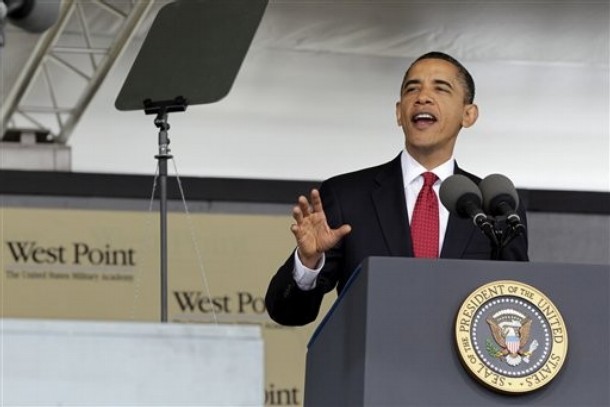
Rumors have President Obama’s National Security Strategy, which is about a year overdue, finally being released tomorrow.
After 16 months in office, the president has given many hints, most notably his Nobel Peace Prize address that emphasized international cooperation. In Oslo, he said: “America cannot insist that others follow the rules of the road if we refuse to follow them ourselves. For when we don’t, our action can appear arbitrary, and undercut the legitimacy of future intervention — no matter how justified.”
He gave another sneak preview last weekend, with his commencement address at West Point. In terms of threats driving intervention, Obama told the graduating cadets, “The international order we seek is one that can resolve the challenges of our times — countering violent extremism and insurgency; stopping the spread of nuclear weapons and securing nuclear materials; combating a changing climate and sustaining global growth; helping countries feed themselves and care for their sick; preventing conflict and healing wounds. If we are successful in these tasks, that will lessen conflicts around the world. It will be supportive of our efforts by our military to secure our country.”
Nuclear terrorism is deemed the most pressing threat by the Obama administration. This has been true for about a decade since bin Laden charged his followers to create an American Hiroshima and it has only been heightened by Iran’s nuclear program and the regime’s use of Hezbollah as a tool of national power.
To be successful in a world where transnational and sub-national groups challenge traditional conceptions of state sovereignty, Obama reiterated his administration’s desire for smart power. He told his West Point audience:
We must build and integrate the capabilities that can advance our interests, and the common interests of human beings around the world. America’s armed forces are adapting to changing times, but your efforts have to be complemented. We will need the renewed engagement of our diplomats, from grand capitals to dangerous outposts. We need development experts who can support Afghan agriculture and help Africans build the capacity to feed themselves. We need intelligence agencies that work seamlessly with their counterparts to unravel plots that run from the mountains of Pakistan to the streets of our cities. We need law enforcement that can strengthen judicial systems abroad, and protect us here at home. And we need first responders who can act swiftly in the event of earthquakes and storms and disease.
The necessity of comprehensive/interagency/whole-of-government solutions has been evident for some time, but other U.S. organizations and allies have yet to commit the resources to such efforts.
This was made plain last week when NATO’s strategic concept was launched. James Joyner wrote: NATO Supreme Allied Commander Jim “Stavridis acknowledged that there had been some failure of Alliance leaders to persuade their citizenry of the value of NATO, which explains why there has been so little political will to live up to the two percent obligation.”
Without resources to turn ideas into action, U.S. and NATO efforts will be challenged. And the U.S. military will remain at the forefront of international efforts to promote security and stability. The Quadrennial Defense Review released earlier this year underscores this point:
Whenever possible, the United States will use force in an internationally sanctioned coalition with allies, international and regional organizations, and like-minded nations committed to these common principles. America’s Armed Forces will retain the ability to act unilaterally and decisively when appropriate, maintaining joint, all-domain military capabilities that can prevail across a wide range of contingencies.
One idea consistent across U.S. administrations for decades is the importance of democracy to international security. For Obama, “together with our friends and allies, America will always seek a world that extends these [universal human] rights so that when an individual is being silenced, we aim to be her voice. Where ideas are suppressed, we provide space for open debate. Where democratic institutions take hold, we add a wind at their back. When humanitarian disaster strikes, we extend a hand. Where human dignity is denied, America opposes poverty and is a source of opportunity. That is who we are. That is what we do.”
For certain, the Obama administration believes in the importance of democracy for international security and stability, but recognizes a democratic planet is no easy feat. Thus, to promote international peace and security now, he has been pursuing a number of initiatives to restart relations with Russia, reduce the number of nuclear warheads, strengthen the trans-Atlantic alliance, and build trust with emerging powers like China, India, and Brazil. To do this, he must convince the world that the United States is not the principal threat to international security as some charged during the Bush years. This will not be easy given the size, experience base, and strategic orientation of the U.S. military today.
Derek Reveron, an Atlantic Council contributing editor, is a professor of national security affairs at the U.S. Naval War College in Newport, Rhode Island. These views are his own. AP Photo.
Image: obama-west-point.jpg
